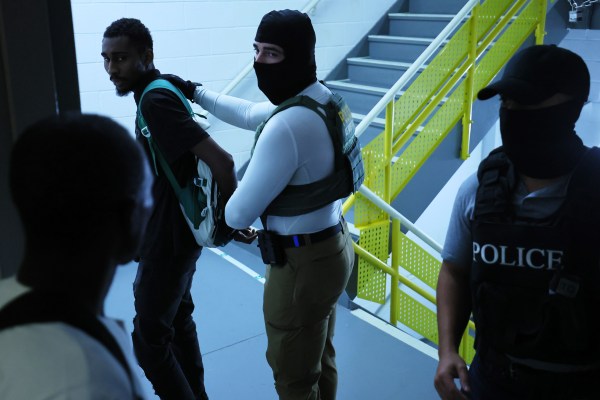Top Trump administration officials and the president himself insist the executive branch must have the power to deport illegal immigrants without minimal due process under the 1798 Alien Enemies Act because it’s the only practical way to carry out mass deportations.
The alternative to such sweeping power, White House adviser Stephen Miller said on Fox News earlier this month, is that “every single invader that Joe Biden let in should get their own individual judicial trial before they’re deported … each one gets a million-dollar trial in front of a communist judge to decide whether or not we can send them home. How about hell no?! How about we pick them up and we get them out of this country, so they can't hurt anyone else?”
And there are Vice President J.D. Vance’s claims. “Consider that Joe Biden allowed approximately 20 million illegal aliens into our country,” Vance wrote on X last week, offering a high estimate of the total number of all illegal immigrants in the country (not merely those who entered since 2021). “The President has successfully stopped the inflow of illegal aliens, and now we must deport the people who came here illegally.”
Trump himself wrote earlier this week in response to a Supreme Court order temporarily halting deportations under the Alien Enemies Act: “We cannot give everyone a trial, because to do so would take, without exaggeration, 200 years.”
But the argument that the Alien Enemies Act is a key tool necessary to carry out mass deportations is absurd on its face. Trump’s proclamation invoking the Alien Enemies Act applied only to a very tiny percentage of the more than 500,000 Venezuelan unauthorized immigrants in the country—those who are members of the gang Tren de Aragua (TdA). While there aren’t reliable estimates for the total number of TdA members in the United States, it is perhaps a number in the thousands. The gang MS-13, which is much more well-established in America than Tren de Aragua, has an estimated 10,000 members in the United States according to the Department of Justice.
In other words, Trump’s Alien Enemies Act proclamation likely applies to less than 0.1 percent of the entire population of 15 million illegal immigrants in the United States.
Deporting members of criminal gangs is no doubt a higher priority than deporting other illegal immigrants, but—contrary to the claims of Miller, Vance, and Trump—nothing supports the notion that illegal immigrants are entitled to million-dollar jury trials that would take centuries to carry out.
The entire budget for the immigration court system was $840 million in 2024. If all illegal immigrants were given million-dollar trials as Miller claims, that budget would allow for the deportation of 840 people. The actual number of deportations carried out by the Department of Homeland Security in 2024 totaled more than 271,000 people. “The idea that it is going to cost a million dollars per case is just Stephen Miller being a propagandist,” Aaron Reichlin-Melnick of American Immigration Council, an organization that advocates on behalf of immigrants, told The Dispatch.
The due process typically afforded to illegal immigrants is spelled out under a federal statute, the Immigration and Nationality Act. That law gives some (but not all) people subject to deportation the opportunity for a hearing before one of roughly 700 immigration judges who are employees of the Department of Justice—not judges under Article III of the U.S. Constitution. People challenging deportation in immigration court have fewer rights and opportunities to appeal decisions than defendants in criminal trials do. There’s no right to a government-appointed lawyer, for example, and the attorney general can overrule immigration court judges. But most deportees in 2024 were removed from the country by expedited removal—including people claiming asylum at the border who failed to pass a “credible fear” screening—without ever even appearing before an immigration court judge.
Trump now claims that he has been “stymied at every turn by even the U.S. Supreme Court ... which seemingly doesn’t want me to send violent criminals and terrorists back to Venezuela, or any other Country.” The standoff between Trump and the Supreme Court over the law has taken the country to the brink of a constitutional crisis. But the high court has not yet ruled on the merits of whether Trump can invoke the Alien Enemies Act against Tren de Aragua. It unanimously ruled on April 7 that those subject to deportation under the Alien Enemies Act must be given notice and a reasonable opportunity to challenge their designation as members of TdA, though the court split 5-4 over which courts should hear such disputes. Over the weekend, a 7-2 Supreme Court majority—apparently alarmed that the Trump administration might carry out more Alien Enemies Act deportations without such minimal due process—temporarily halted AEA deportations.
Apart from the AEA, existing immigration law provides multiple avenues for deporting suspected gang members. According to U.S. Immigration and Customs Enforcement (ICE), last year 3,706 “known or suspected gang members” were deported—not far below the 4,276 “known or suspected” gang members deported during the last year of Trump’s first term.
And Trump’s decision to have the State Department designate Tren de Aragua and other transnational gangs as “foreign terrorist organizations” under the Immigration and Nationality Act will make it even easier to deport known or suspected gang members. There are plenty of problems with existing immigration law—including a backlog of 2 million asylum cases—but the “foreign terrorist designation” means that an illegal immigrant found by an immigration court judge to be a member of Tren de Aragua cannot claim asylum. Only “very limited relief under the Convention Against Torture” could be sought, according to Reichlin-Melnick. While such relief would prevent deportation to a country where the individual would likely be tortured, such relief would not prevent deportation to a third country where the likelihood of torture is absent.
Cutting against the Trump administration’s complaints about recent court rulings, several factors unrelated to the Alien Enemies Act could still stymie Trump’s efforts to carry out mass deportations.
First, Trump’s policies have succeeded in mostly shutting down the flow of illegal immigrants at the southern border. It’s much more difficult to find, detain, and deport people once they are in the interior of the country than simply turning them around at the border. That’s why there were reportedly fewer deportations (which includes people turned away at the border) carried out this March than last March. The Atlantic’s Nick Miroff reported last week that according to unpublished ICE data he obtained, there were about 18,500 deportations in March 2025, down from 23,100 in March 2024.
Second, there are limits on detention capacity. ICE has the ability right now to hold fewer than 50,000 people in detention—and it is currently operating at that max capacity. Border czar Tom Homan has said with additional funding from Congress, he’d like to get that number up to 100,000. But even with higher detention capacity, it’s going to be difficult for Trump to get to his goal of 1 million people deported this year. Uncomplicated deportation proceedings still take some time and resources. “Even if you’re dealing with people from Mexico or Central America where the governments are not obstructing the return of their own citizens, you’re still going hold people [in detention] for a week or two to get the paperwork lined up,” Mark Krikorian of the Center for Immigration Studies told The Dispatch.
Third, Trump seems reluctant, for now, to carry out the kind of worksite raids at scale that could greatly increase the number of deportations. If ICE is “sending five guys to arrest one Venezuelan gangbanger, you’re not going to get big numbers that way. The way you’re going to get higher numbers of removals is when they step up worksite enforcement,” Krikorian, a prominent immigration hawk, told The Dispatch in late March. “The five guys you sent to arrest one gang member can actually turn up 20 or 30 or 40 illegal aliens” at a worksite. But on April 10, Trump indicated he was wary of such raids on a large scale. “We have to take care of our farmers and our hotels and various places where they need the people" who are illegal immigrants to work, he said.
But ultimately, Trump’s ability to carry out mass deportations will not hinge on whether he has unchecked power to target 0.1 percent of the total population of illegal immigrants for deportation via the Alien Enemies Act rather than the Immigration and Nationality Act.







Please note that we at The Dispatch hold ourselves, our work, and our commenters to a higher standard than other places on the internet. We welcome comments that foster genuine debate or discussion—including comments critical of us or our work—but responses that include ad hominem attacks on fellow Dispatch members or are intended to stoke fear and anger may be moderated.
With your membership, you only have the ability to comment on The Morning Dispatch articles. Consider upgrading to join the conversation everywhere.